Discover Amber’s VET (vocational education and training) project working with animals in Aruba (Erasmus+).
Project supported by the Erasmus+ programme of the European Union, in partnership with Askham Bryan College and Aruba Donkey Sanctuary.

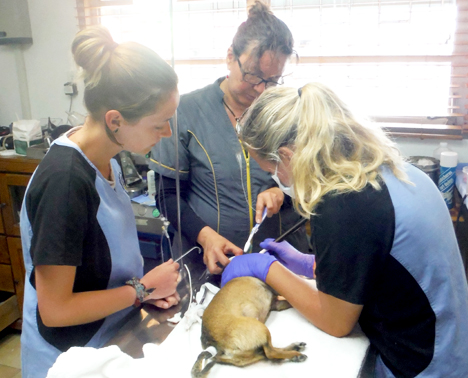
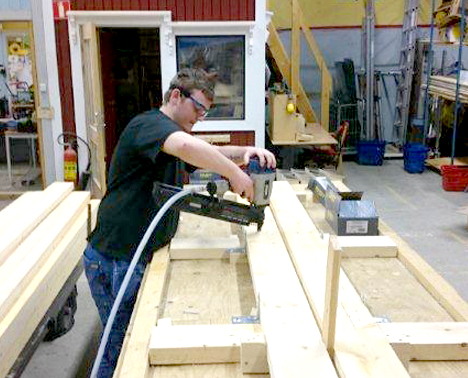
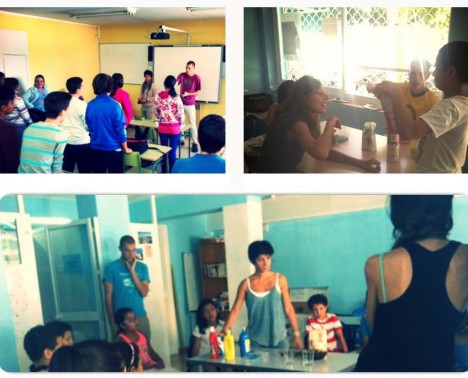
Hi, my name is Josh, I’m 24, I am just finishing a 10 month European Voluntary Service project in Sevilla, Spain. I chose this EVS (European Voluntary Service) project predominantly because it was working with young people, and for a long time I’d had an interest in Spanish culture and wanted to experience it first hand. In the UK, I worked as a Youth Worker, and hold a degree in Youth Work & Community Development. Therefore I was searching for voluntary positions within this sector.
My organisation works with migrants with low-incomes who require support with various things; from immigration/resident application processes, employment opportunities, language support or, most relevant to my position within the organisation, educational support for children and young people (ranging from 6-16 years of age).
In my position, I organised and participated in a program of curricular support classes, and informal education workshops. Within our regular weekly programme we had 3 days of curricular support sessions, a sports workshop, an English workshop, a creativity-based session for children and a youth work session for teenagers. Within the curricular support sessions, we supported children and young people with areas of their academic development in which they needed extra help; we worked with the local schools in determining these areas, and of course constantly assessing their progress. The sports workshop aimed to promote physical activities and sports, and as such we offered a different sport or physical activity each work. The main challenge was ensuring the participation of all: with a huge range of abilities and kids as young as 6 to teenagers of 15 years old in the same group, this could often require innovative ways of ensuring that everyone was involved in the activities.
The English workshops used an informal education approach: we used games, sports activities, songs and theatre in our sessions. We were not and did pretend to be a school: besides, the kids had already had 8 hours of formal education each day, so we tried to use different methods to class-style learning. In the creativity-based session, for kids from 6-11, we used art, drama, music and other creative methods to run educative sessions around a huge range of themes: for example constructing planets from papier-mache, whilst also learning about their comparative sizes, colours, and characteristics, or writing and constructing a group story book.
The youth work sessions were for young people aged from 12-16, and in these sessions we used roleplay, talks and debates, excursions and other methods to explore topics such as gender violence and democratic participation. We also visited exhibitions, events in the city, organised orienteering in a local park amongst other things.
During the summer we had a daytime programme rather than our evening sessions, and as it was the school holidays, we didn’t run the curricular support sessions and instead ran more of the informal educational sessions. We also organised a 6 day summer camp in the countryside, with 42 kids and teenagers, we ran activities such as hikes, rafting, climbing, sports and outdoor games.
The project and EVS experience in general has been an amazing experience, and one which has helped me develop both professionally and personally. My work with the children and young people has increased my experience, knowledge and capacity as a practitioner: from new activity ideas, working with groups with a huge range of ages and abilities, and communication without a fluent language ability. Personally, it has been fantastic as well: one of the great things is that you meet, and live with, people from different countries and cultures: in our lives in our home countries we often group around people of the same interests and social groups, and in EVS you meet, work and live with people that perhaps otherwise you wouldn’t have had the opportunity to meet.
Arriving in a new country and not speaking the language was extremely difficult at first, but has also taught me a lot about how language can dictate how much autonomy and independence you have with self-expression, and how debilitating it can be to not have the linguistic tools at your disposal to express yourself how you would like. Since I arrived I was determined to not speak any English at all (not at work nor at home): although this meant a very difficult and frustrating 2-3 months, it meant I learnt quickly and am now proud that I can say I speak Spanish.
The experience will change me in so many ways: I have learnt a lot about myself and about others through this experience, I have been inspired to explore the possibilities for working with Erasmus Plus within my profession in Leeds, and have a clearer idea of what I would like to do in the future. Holistically, it has changed my perspectives on certain things, and how I feel about what is possible and what can be achieved.
Josh Booth, long-term EVS (European Voluntary project) volunteer
European Voluntary Service (EVS) project supported by the Erasmus+ programme of the European Commission.
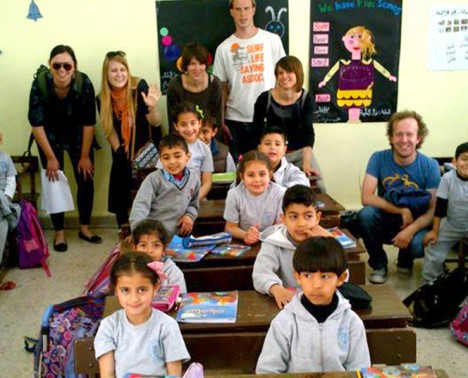
There is a prevailing trend in the non-profit sector; an insidious illness emerging from the peroration which often envelopes the area. Increasingly, actors are seeking to force an ill-fitting, rigid formula onto the liquid consistency of human emotions. Success is measured in cold, hard facts; how many adults gained job opportunities as a result of this project? How many children entered higher education? How many volunteers gained a second language? How many women did we successfully emancipate? How many re-tweets of our hashtag?
The approach is driven by undeniably logical factors. Charities are attempting to attract large donors whose manner of assessment is the only one they know; tangible results in return for an investment which they can subsequently sell to their conscious-impoverished clientèle. But this trend is a wind blowing above the ripples on the water, ripples which become swells and eventually waves. But how can one revel in the waves, if one doesn’t notice the ripples from which they are born?
It is these small movements which I am to write about; the unnoticed behaviour of the reserved. I am to tell you that success is not found in numbers, but in the most tender and reserved human behaviour. I am to tell you this because I believe myself to have been lucky enough to be privy to those moments, durable by their existence in my memory, transient by that by that very fact. The European Voluntary Scheme has gifted such experiences to me, but is setting to take them away from others. I write in protest of that trend and to espouse a different approach.
I cannot tell you how many women I have taught whom have subsequently felt emancipated, nor how many of the youth I have taught felt better inclined towards employment. I cannot even tell you how many new words they gained. What I can tell you about is the feeling one gets when a pupil who could not conceive an English greeting, suddenly constructs a sentence from words you had forgot you’d taught her. Or a sense of value when one woman approaches you after class and tells you that she is a housewife, bound by the rules of her conservative partner and by the rigours of motherhood to a multitude of children. She tells you that she is freed in the six hours a week you teach her; allowed to travel, learn, socialise and develop in independence. She tells you that she was married very young, deprived of a thorough education not only by her circumstances, but by a system that failed her. She tells you that you are her only chance to have an education that is hers.
Only a week ago, I was sat outside my class, waiting for it to begin. I had often expressed my want to become fluent in Arabic, eying their street Arabic to English dictionaries jealousy. I thought these green glances had gone unnoticed, and perhaps they had for all bar one little girl. She came to me and presented a beautiful, hard-backed dictionary. Costly, for anyone of her background, but especially for a young girl of no income. She said, “For you. Now you can go home and show people that Muslims are different to DAESH [ISIS]. Thank you for everything”.
You can assess your numbers, analysis your data, process your questionnaires, but you cannot capture those moments. Nor should you want to; their value lies in their transience and fragility. You should instead seek solace in a volunteer’s word, a volunteer who is graced with those fleeting interactions and with the residue of their impact. Take heed, before you lose those moments in the pages of your books.
Katie Williams, EVS (European Voluntary Service) volunteer
European Voluntary Service (EVS) project supported by the Erasmus+ programme of the European Commission.
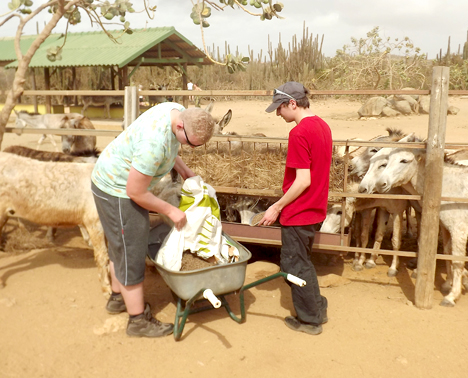
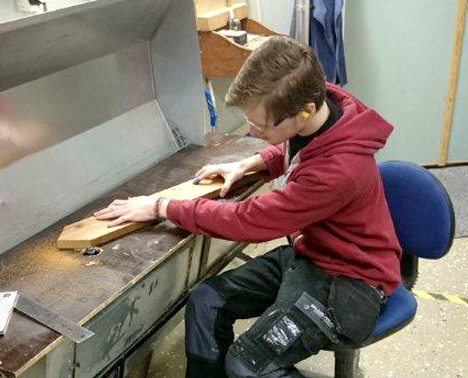
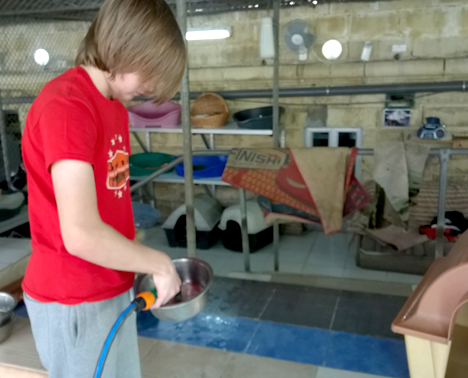
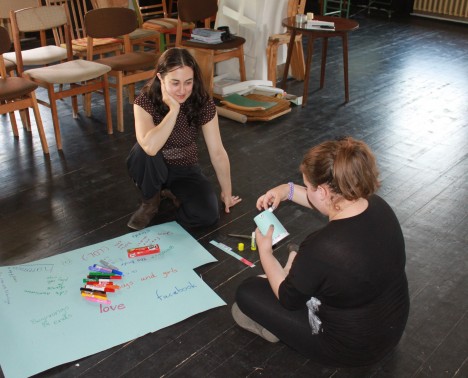
So many great things have been happening in our community theatre throughout the prolonged winter we had and the first slow arrivals of spring, which is now in full bloom (indeed one of the things I enjoy here in Hungary is observing the seasons, which in difference to other countries I have lived in – such as England or Israel – each carry a very different character). I would tell you about a couple of them, which to me have been (only) some of the most significant. European Voluntary Service.
At the end of February I have hosted an evening in our theatre for the people of Jászberény. I started it by performing a short mime show created by myself about my refusal to join the Israeli army when I was 17. This experience, explained from both a personal and a comic point of view, provided an intro into the main part of the evening: an informative talk which was meant to shed light on the history of the conflict in the region I have grown up in, of Israel-Palestine. The feedback from the audience was both very appreciative and interested. I was pleased of that, glad to have been contributing knowledge on an important issue in the world, and also felt that the event was building a step up in the acquaintance and connection between me and the local community.
A month later I repeated the performance and talk, with some adaptations of course, for a local crowd of teenagers, who have been incredibly interested too. Again I was delighted to feel I have brought something of value and interest to them.
The second of the few most significant events in the last term was opening a new class of visual theatre to a group of 10-14 year-olds. This class is a laboratory for experimentation with ideas new to the students and sometimes new to me too. We explore the use of visual art in performance by many different approaches and through the use of very different means: what can we create with broken chair parts? What costumes and sets can we create with old brochures? How can we play with an image projected on a curtain through a projector, and with “eyeballs” made of polystyrene balls being placed on different parts of our body? The main idea is experimentation and play that stem from looking at something in a different way, and it is a delight watching the students create to the stimulations and responding to them from a visceral experience. Watch this space for more detail that I will provide after we had our final show in June. We are currently working towards it, with all groups, while the spring is turning summery and the apples and cherries in our garden are beginning to grow.
Roni M, EVS (European Voluntary Service) volunteer
European Voluntary Service (EVS) project supported by the Erasmus+ programme of the European Commission.
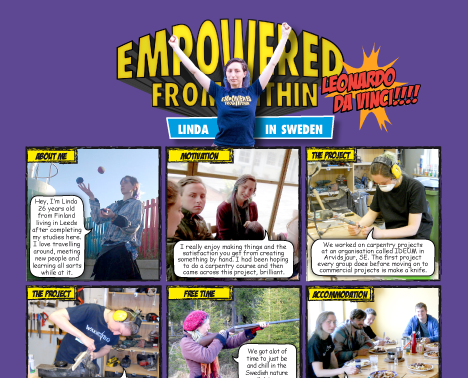
The 26th and last episode of our comic book ”Empowered From Within” is out!
Discover Linda’s testimony about her Leonardo Da Vinci Mobility project in Sweden:
Project supported by ECORYS UK and the Lifelong Learning programme (Now Erasmus+) of the European Union.
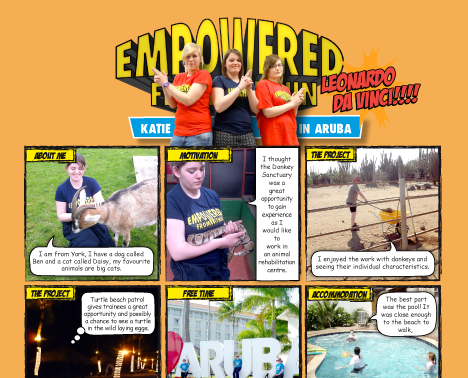
Project supported by ECORYS UK and the Lifelong Learning programme (Now Erasmus+) of the European Union.